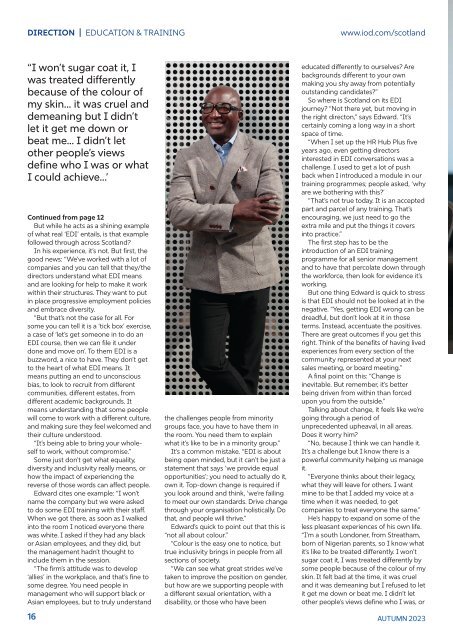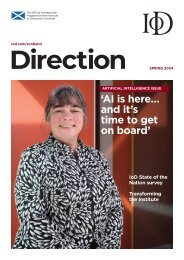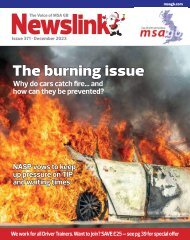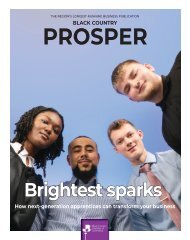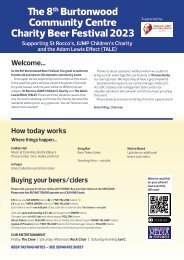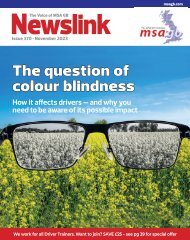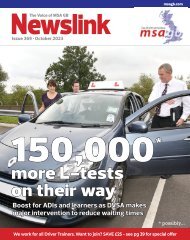Direction Autumn 2023 - IoD Scotland members magazine
Business advice, information. IoD events. Directors' technical briefings
Business advice, information. IoD events. Directors' technical briefings
Create successful ePaper yourself
Turn your PDF publications into a flip-book with our unique Google optimized e-Paper software.
DIRECTION | EDUCATION & TRAINING<br />
www.iod.com/scotland<br />
“I won’t sugar coat it, I<br />
was treated differently<br />
because of the colour of<br />
my skin... it was cruel and<br />
demeaning but I didn’t<br />
let it get me down or<br />
beat me... I didn’t let<br />
other people’s views<br />
define who I was or what<br />
I could achieve...’<br />
Continued from page 12<br />
But while he acts as a shining example<br />
of what real ‘EDI’ entails, is that example<br />
followed through across <strong>Scotland</strong>?<br />
In his experience, it’s not. But first, the<br />
good news: “We’ve worked with a lot of<br />
companies and you can tell that they/the<br />
directors understand what EDI means<br />
and are looking for help to make it work<br />
within their structures. They want to put<br />
in place progressive employment policies<br />
and embrace diversity.<br />
“But that’s not the case for all. For<br />
some you can tell it is a ‘tick box’ exercise,<br />
a case of ‘let’s get someone in to do an<br />
EDI course, then we can file it under<br />
done and move on’. To them EDI is a<br />
buzzword, a nice to have. They don’t get<br />
to the heart of what EDI means. It<br />
means putting an end to unconscious<br />
bias, to look to recruit from different<br />
communities, different estates, from<br />
different academic backgrounds. It<br />
means understanding that some people<br />
will come to work with a different culture,<br />
and making sure they feel welcomed and<br />
their culture understood.<br />
“It’s being able to bring your wholeself<br />
to work, without compromise.”<br />
Some just don’t get what equality,<br />
diversity and inclusivity really means, or<br />
how the impact of experiencing the<br />
reverse of those words can affect people.<br />
Edward cites one example: “I won’t<br />
name the company but we were asked<br />
to do some EDI training with their staff.<br />
When we got there, as soon as I walked<br />
into the room I noticed everyone there<br />
was white. I asked if they had any black<br />
or Asian employees, and they did, but<br />
the management hadn’t thought to<br />
include them in the session.<br />
“The firm’s attitude was to develop<br />
‘allies’ in the workplace, and that’s fine to<br />
some degree. You need people in<br />
management who will support black or<br />
Asian employees, but to truly understand<br />
the challenges people from minority<br />
groups face, you have to have them in<br />
the room. You need them to explain<br />
what it’s like to be in a minority group.”<br />
It’s a common mistake. “EDI is about<br />
being open minded, but it can’t be just a<br />
statement that says ‘we provide equal<br />
opportunities’; you need to actually do it,<br />
own it. Top-down change is required if<br />
you look around and think, ‘we’re failing<br />
to meet our own standards. Drive change<br />
through your organisation holistically. Do<br />
that, and people will thrive.”<br />
Edward’s quick to point out that this is<br />
“not all about colour.”<br />
“Colour is the easy one to notice, but<br />
true inclusivity brings in people from all<br />
sections of society.<br />
“We can see what great strides we’ve<br />
taken to improve the position on gender,<br />
but how are we supporting people with<br />
a different sexual orientation, with a<br />
disability, or those who have been<br />
educated differently to ourselves? Are<br />
backgrounds different to your own<br />
making you shy away from potentially<br />
outstanding candidates?”<br />
So where is <strong>Scotland</strong> on its EDI<br />
journey? “Not there yet, but moving in<br />
the right directon,” says Edward. “It’s<br />
certainly coming a long way in a short<br />
space of time.<br />
“When I set up the HR Hub Plus five<br />
years ago, even getting directors<br />
interested in EDI conversations was a<br />
challenge. I used to get a lot of push<br />
back when I introduced a module in our<br />
training programmes; people asked, ‘why<br />
are we bothering with this?’<br />
“That’s not true today. It is an accepted<br />
part and parcel of any training. That’s<br />
encouraging, we just need to go the<br />
extra mile and put the things it covers<br />
into practice.”<br />
The first step has to be the<br />
introduction of an EDI training<br />
programme for all senior management<br />
and to have that percolate down through<br />
the workforce, then look for evidence it’s<br />
working.<br />
But one thing Edward is quick to stress<br />
is that EDI should not be looked at in the<br />
negative. “Yes, getting EDI wrong can be<br />
dreadful, but don’t look at it in those<br />
terms. Instead, accentuate the positives.<br />
There are great outcomes if you get this<br />
right. Think of the benefits of having lived<br />
experiences from every section of the<br />
community represented at your next<br />
sales meeting, or board meeting.”<br />
A final point on this: “Change is<br />
inevitable. But remember, it’s better<br />
being driven from within than forced<br />
upon you from the outside.”<br />
Talking about change, it feels like we’re<br />
going through a period of<br />
unprecedented upheaval, in all areas.<br />
Does it worry him?<br />
“No, because I think we can handle it.<br />
It’s a challenge but I know there is a<br />
powerful community helping us manage<br />
it.<br />
“Everyone thinks about their legacy,<br />
what they will leave for others. I want<br />
mine to be that I added my voice at a<br />
time when it was needed, to get<br />
companies to treat everyone the same.”<br />
He’s happy to expand on some of the<br />
less pleasant experiences of his own life.<br />
“I’m a south Londoner, from Streatham,<br />
born of Nigerian parents, so I know what<br />
it’s like to be treated differently. I won’t<br />
sugar coat it, I was treated differently by<br />
some people because of the colour of my<br />
skin. It felt bad at the time, it was cruel<br />
and it was demeaning but I refused to let<br />
it get me down or beat me. I didn’t let<br />
other people’s views define who I was, or<br />
16 AUTUMN <strong>2023</strong>


